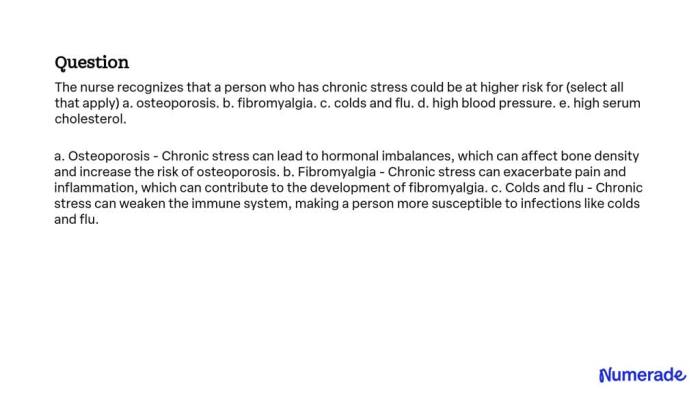The nurse recognizes which statement is true of chronic pain, a complex and debilitating condition that affects millions of people worldwide. This article delves into the nature, assessment, impact, management, and nursing considerations of chronic pain, providing healthcare professionals with a comprehensive understanding of this prevalent condition.
Chronic pain, defined as pain that persists for more than three months, can arise from various underlying medical conditions and significantly impair an individual’s physical, psychological, and social well-being. Nurses play a pivotal role in assessing, managing, and supporting patients with chronic pain, emphasizing patient education, self-management strategies, and emotional support.
Definition and Characteristics of Chronic Pain: The Nurse Recognizes Which Statement Is True Of Chronic Pain

Chronic pain is defined as pain that persists or recurs for more than 3 months. It is distinct from acute pain, which is typically caused by an injury or illness and resolves within a few weeks or months.
Chronic pain can be caused by a variety of factors, including nerve damage, inflammation, and muscle spasms. It can affect any part of the body and can range in intensity from mild to severe.
Some common chronic pain conditions include:
- Back pain
- Neck pain
- Headaches
- Arthritis
- Fibromyalgia
- Neuropathy
- Cancer pain
Assessment of Chronic Pain
Assessing chronic pain is a complex process that involves both patient self-reporting and objective measures.
Patient self-reporting is essential for understanding the patient’s experience of pain. This can be done through pain scales, pain diaries, and patient interviews.
Objective measures can provide additional information about the severity and impact of pain. These measures may include physical examination, imaging studies, and nerve conduction studies.
Impact of Chronic Pain, The nurse recognizes which statement is true of chronic pain
Chronic pain can have a significant impact on a person’s physical, psychological, and social well-being.
Physically, chronic pain can lead to:
- Disability
- Fatigue
- Muscle weakness
- Sleep problems
Psychologically, chronic pain can lead to:
- Depression
- Anxiety
- Mood swings
- Cognitive impairment
Socially, chronic pain can lead to:
- Isolation
- Relationship problems
- Financial difficulties
- Employment problems
Management of Chronic Pain
The management of chronic pain is a complex process that involves a variety of treatment options.
Pharmacological therapies include medications such as opioids, nonsteroidal anti-inflammatory drugs (NSAIDs), and antidepressants.
Non-pharmacological therapies include physical therapy, occupational therapy, chiropractic care, and acupuncture.
Interventional therapies include injections, nerve blocks, and surgery.
Interdisciplinary Care for Chronic Pain
Chronic pain management is most effective when it is provided by a team of healthcare professionals from different disciplines.
This team may include:
- Physicians
- Nurses
- Physical therapists
- Occupational therapists
- Psychologists
- Social workers
Each member of the team plays a specific role in providing comprehensive care to the patient.
Nursing Considerations in Chronic Pain Management
Nurses play a vital role in the management of chronic pain.
Nurses are responsible for:
- Assessing pain
- Managing pain medications
- Providing patient education
- Supporting patients and their families
Nurses can also help patients develop self-management strategies and provide emotional support.
Advancements in Chronic Pain Management
There have been a number of advancements in chronic pain management in recent years.
These advancements include:
- New medications
- New interventional therapies
- New technologies
These advancements have led to improved pain relief and quality of life for patients with chronic pain.
Research in Chronic Pain
There is a great deal of ongoing research in chronic pain management.
This research is focused on:
- Understanding the causes of chronic pain
- Developing new treatments
- Improving the quality of life for patients with chronic pain
This research is essential for improving the understanding and treatment of chronic pain.
Q&A
What is the primary role of a nurse in chronic pain management?
Nurses play a crucial role in assessing, managing, and supporting patients with chronic pain. They provide patient education, implement self-management strategies, and offer emotional support to enhance the patient’s overall well-being.
How does chronic pain impact an individual’s life?
Chronic pain can have a profound impact on an individual’s physical, psychological, and social well-being. It can lead to reduced mobility, impaired sleep, depression, anxiety, and diminished quality of life.
What are the common treatment options for chronic pain?
Treatment options for chronic pain vary depending on the underlying cause and severity of the pain. They may include pharmacological therapies (e.g., opioids, non-steroidal anti-inflammatory drugs), non-pharmacological therapies (e.g., physical therapy, acupuncture), and interventional therapies (e.g., nerve blocks, surgery).


